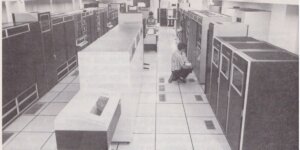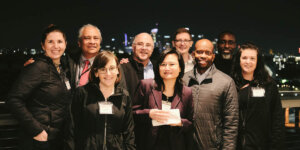In Nebraska, a national drought prediction system prevents crop loss by telling farmers the best places to plant in each county next year. Tucson detectives use an artificial intelligence-based crime lead generator to help them investigate cases with so little starting information they used to consider them unsolvable. These and other innovative uses of information technology by government were the topic of a National Conference on Digital Government Research in Redondo Beach.
 Hosted by ISI, the three-day conference brought together more than 170 participants from the computer science, government, industry, and public policy sectors to consider the research needed to meet accelerating expectations for effective online government.”When it comes to digital government or e-government technologies, most of the public, and even most government workers, are still thinking ‘web site,'” said Larry Brandt, manager of the National Science Foundation’s Digital Government Program, which sponsored the conference. “Our purpose is to push the envelope.”
Hosted by ISI, the three-day conference brought together more than 170 participants from the computer science, government, industry, and public policy sectors to consider the research needed to meet accelerating expectations for effective online government.”When it comes to digital government or e-government technologies, most of the public, and even most government workers, are still thinking ‘web site,'” said Larry Brandt, manager of the National Science Foundation’s Digital Government Program, which sponsored the conference. “Our purpose is to push the envelope.”
DG.O 2001’s research presentations and very well-attended evening demo sessions showed that the NSF DG program’s high-end technologies are already much in demand among federal and state agencies.
Agency partners showed applications using decision support systems, and that harnessed research on geospatial information systems, data mining, information integration, and human-computer interface design.
Social and policy issues were another key element of the conference. Keynote speaker Dr. Stuart Lynn, director of the Internet Corporation for Assigned Names and Numbers (ICANN), set the stage for a complex topic by discussing ICANN as one among a new group of players in digital government.
ICANN, he said, was an official albeit non-governmental body that performs high-level governance functions for the Internet and yet must remain neutral in its relationships with individual governments.
Yigal Arens, a ISI division director and chair of DG.O 2001, said the need for coordination among government bodies and the public at large is growing.
“In the past,” Arens noted, “digital government was seen as being mostly about technology and tools. Now we see what a significant impact it’s likely to have on public policy and on people’s lives. The public’s growing experience with e-commerce is raising the bar for what it expects from government agencies. But it’s also clear that we can’t just throw new technologies at these problems. We need to understand the larger implications of how we use these technologies and how they may change society.”
The conference was also followed with a one-day NSF mini-workshop on setting an urban agenda for DG research. The final report from this workshop is expected shortly and its Grand Challenges will be considered for a possible new NSF DG Program initiative.
Published on September 27th, 2001
Last updated on August 10th, 2021













